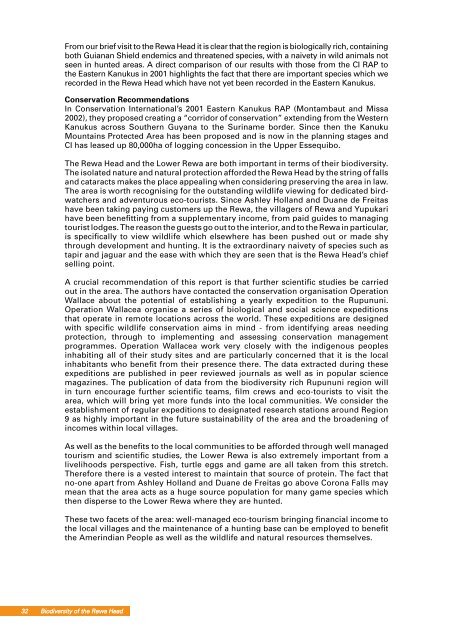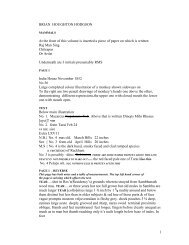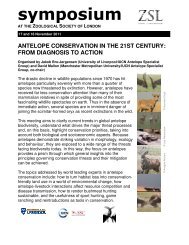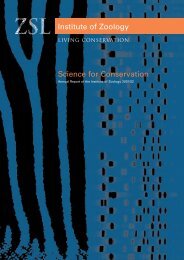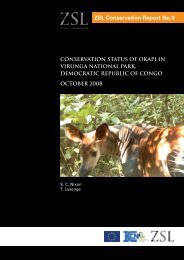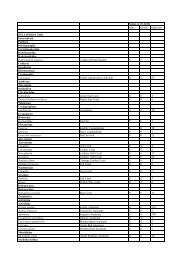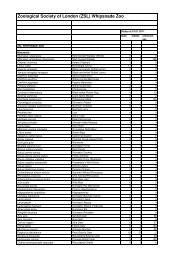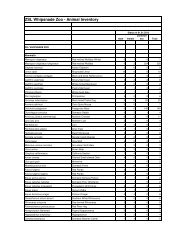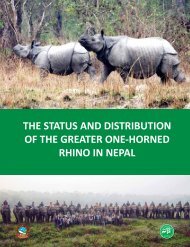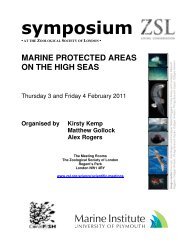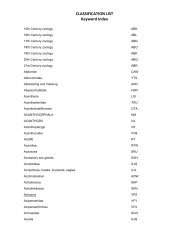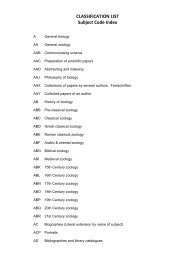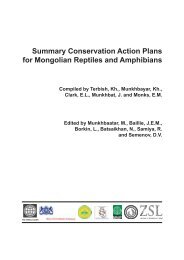Biodiversity of the Rewa Head B Zoological Society of London ...
Biodiversity of the Rewa Head B Zoological Society of London ...
Biodiversity of the Rewa Head B Zoological Society of London ...
You also want an ePaper? Increase the reach of your titles
YUMPU automatically turns print PDFs into web optimized ePapers that Google loves.
From our brief visit to <strong>the</strong> <strong>Rewa</strong> <strong>Head</strong> it is clear that <strong>the</strong> region is biologically rich, containing<br />
both Guianan Shield endemics and threatened species, with a naivety in wild animals not<br />
seen in hunted areas. A direct comparison <strong>of</strong> our results with those from <strong>the</strong> CI RAP to<br />
<strong>the</strong> Eastern Kanukus in 2001 highlights <strong>the</strong> fact that <strong>the</strong>re are important species which we<br />
recorded in <strong>the</strong> <strong>Rewa</strong> <strong>Head</strong> which have not yet been recorded in <strong>the</strong> Eastern Kanukus.<br />
Conservation Recommendations<br />
In Conservation International’s 2001 Eastern Kanukus RAP (Montambaut and Missa<br />
2002), <strong>the</strong>y proposed creating a “corridor <strong>of</strong> conservation” extending from <strong>the</strong> Western<br />
Kanukus across Sou<strong>the</strong>rn Guyana to <strong>the</strong> Suriname border. Since <strong>the</strong>n <strong>the</strong> Kanuku<br />
Mountains Protected Area has been proposed and is now in <strong>the</strong> planning stages and<br />
CI has leased up 80,000ha <strong>of</strong> logging concession in <strong>the</strong> Upper Essequibo.<br />
The <strong>Rewa</strong> <strong>Head</strong> and <strong>the</strong> Lower <strong>Rewa</strong> are both important in terms <strong>of</strong> <strong>the</strong>ir biodiversity.<br />
The isolated nature and natural protection afforded <strong>the</strong> <strong>Rewa</strong> <strong>Head</strong> by <strong>the</strong> string <strong>of</strong> falls<br />
and cataracts makes <strong>the</strong> place appealing when considering preserving <strong>the</strong> area in law.<br />
The area is worth recognising for <strong>the</strong> outstanding wildlife viewing for dedicated birdwatchers<br />
and adventurous eco-tourists. Since Ashley Holland and Duane de Freitas<br />
have been taking paying customers up <strong>the</strong> <strong>Rewa</strong>, <strong>the</strong> villagers <strong>of</strong> <strong>Rewa</strong> and Yupukari<br />
have been benefitting from a supplementary income, from paid guides to managing<br />
tourist lodges. The reason <strong>the</strong> guests go out to <strong>the</strong> interior, and to <strong>the</strong> <strong>Rewa</strong> in particular,<br />
is specifically to view wildlife which elsewhere has been pushed out or made shy<br />
through development and hunting. It is <strong>the</strong> extraordinary naivety <strong>of</strong> species such as<br />
tapir and jaguar and <strong>the</strong> ease with which <strong>the</strong>y are seen that is <strong>the</strong> <strong>Rewa</strong> <strong>Head</strong>’s chief<br />
selling point.<br />
A crucial recommendation <strong>of</strong> this report is that fur<strong>the</strong>r scientific studies be carried<br />
out in <strong>the</strong> area. The authors have contacted <strong>the</strong> conservation organisation Operation<br />
Wallace about <strong>the</strong> potential <strong>of</strong> establishing a yearly expedition to <strong>the</strong> Rupununi.<br />
Operation Wallacea organise a series <strong>of</strong> biological and social science expeditions<br />
that operate in remote locations across <strong>the</strong> world. These expeditions are designed<br />
with specific wildlife conservation aims in mind - from identifying areas needing<br />
protection, through to implementing and assessing conservation management<br />
programmes. Operation Wallacea work very closely with <strong>the</strong> indigenous peoples<br />
inhabiting all <strong>of</strong> <strong>the</strong>ir study sites and are particularly concerned that it is <strong>the</strong> local<br />
inhabitants who benefit from <strong>the</strong>ir presence <strong>the</strong>re. The data extracted during <strong>the</strong>se<br />
expeditions are published in peer reviewed journals as well as in popular science<br />
magazines. The publication <strong>of</strong> data from <strong>the</strong> biodiversity rich Rupununi region will<br />
in turn encourage fur<strong>the</strong>r scientific teams, film crews and eco-tourists to visit <strong>the</strong><br />
area, which will bring yet more funds into <strong>the</strong> local communities. We consider <strong>the</strong><br />
establishment <strong>of</strong> regular expeditions to designated research stations around Region<br />
9 as highly important in <strong>the</strong> future sustainability <strong>of</strong> <strong>the</strong> area and <strong>the</strong> broadening <strong>of</strong><br />
incomes within local villages.<br />
As well as <strong>the</strong> benefits to <strong>the</strong> local communities to be afforded through well managed<br />
tourism and scientific studies, <strong>the</strong> Lower <strong>Rewa</strong> is also extremely important from a<br />
livelihoods perspective. Fish, turtle eggs and game are all taken from this stretch.<br />
Therefore <strong>the</strong>re is a vested interest to maintain that source <strong>of</strong> protein. The fact that<br />
no-one apart from Ashley Holland and Duane de Freitas go above Corona Falls may<br />
mean that <strong>the</strong> area acts as a huge source population for many game species which<br />
<strong>the</strong>n disperse to <strong>the</strong> Lower <strong>Rewa</strong> where <strong>the</strong>y are hunted.<br />
These two facets <strong>of</strong> <strong>the</strong> area: well-managed eco-tourism bringing financial income to<br />
<strong>the</strong> local villages and <strong>the</strong> maintenance <strong>of</strong> a hunting base can be employed to benefit<br />
<strong>the</strong> Amerindian People as well as <strong>the</strong> wildlife and natural resources <strong>the</strong>mselves.<br />
32 <strong>Biodiversity</strong> <strong>of</strong> <strong>the</strong> <strong>Rewa</strong> <strong>Head</strong>


